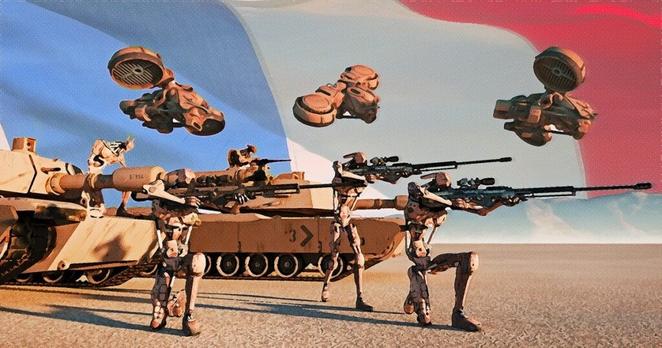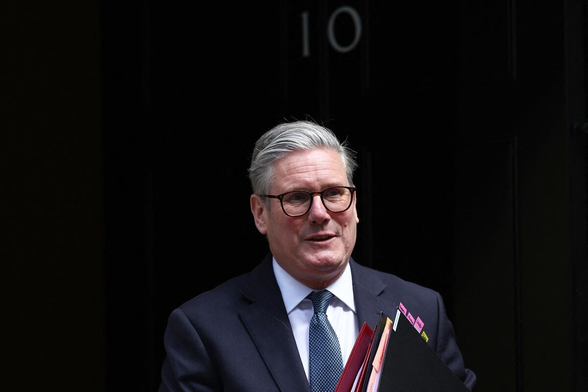France Wants to Roll Out Robot Army by 2040 https://www.byteseu.com/999121/ #ArmedConflict #BrunoBaratz #France #FrenchArmy #FrenchGovernment #MilitarySpending #TechStartups
Recent searches
Search options
#militaryspending






this is the end for my country:
a country with 3 trillion in debt,health care in shambles, schools and universities in shambles,CANNOT afford a 2% GDP #militarySpending.From 2001 to 2010,both right and left govts resisted,now #Meloni goes ahead
[Italian]





Andrew Harnik highlights that President Donald Trump will unveil his 2026 budget proposal, detailing federal spending priorities and economic forecasts. The plan emphasizes a military budget over $1 trillion and potential cuts exceeding $160 billion impacting various sectors. While the proposal is pivotal, Congress will ultimately draft the spending legislation. Explore the nuances of this budget and its implications: https://www.cnbc.com/2025/05/02/trump-plans-to-unveil-federal-budget-proposal-on-friday.html
#Trump #USBudget2026 #FiscalYear #Congress #TaxCuts #MilitarySpending #GovernmentCuts
World military spending hit a record $2.7 trillion in 2024, up 9.4% — the sharpest rise since 1988. Spending rose across all regions for the 2nd year running. Where does India stand, and what does this arms race mean for the global economy? Today's Number Theory explores this in detail.
Read on HT app: https://www.hindustantimes.com/editors-pick/understanding-global-military-expenditure-number-theory-101745894911408.html
#Defense #MilitarySpending #Military #SIPRI #US #China #Ukraine #India #Germany #Russia #DataViz @mastodonindians #MastIndia
Experts warn Trump’s tariff, troop cost plans may undermine US-South Korea alliance https://www.byteseu.com/945659/ #DonaldTrump #MilitarySpending #SouthKorea #SouthKoreaMilitary #tariffs #TrumpSouthKorea #TrumpTariffs #U.S. #U.s.SouthKorea
Spend more on defence now to protect Europe from Russia, says Lithuania’s defence minister https://www.byteseu.com/935513/ #DefenceCapabilities #DefenceFund #DefenceMinister #DefenceSpending #Europe #EuropeanUnion #Lithuania #MilitarySpending #MinisterDovileSakaliene #NATO #Russia
https://www.europesays.com/uk/30012/ US urges France to take lead on European defense #DefenseMinister #EU #Europe #France #MilitarySpending #NATOAllies #PeteHegseth #PresidentDonaldTrump #SébastienLecornu #Ukraine #UkraineConflict #Washington
Opinion | Why Are ‘Hands Off’ Rallies Defending War-Hungry NATO? https://www.byteseu.com/895864/ #ColdWar #Europe #EuropeanUnion #Healthcare #MilitarySpending #NATO #Russia #SocialSecurity #UkraineWar
$40 million spent detaining 400 migrants at #Guantánamo? Senators call it a costly, legally murky disaster. #Immigration #MilitarySpending https://buff.ly/gqgOLnS
Europe is on a mission—defense spending is soaring! Leaders push billions for local firms, yet experts warn U.S. contractors will still benefit. While the EU aims to prioritize European suppliers, strong U.S. players complicate matters. As budgets expand, the goal of self-sufficiency in defense faces hurdles. Explore the intricate dynamics of Europe's military investments and the ongoing reliance on the U.S. for defense solutions. Read more here: [Source](https://www.cnbc.com/2025/03/26/european-defense-spending-where-will-the-money-go.html) #Defense #Europe #MilitarySpending #Geopolitics #NATO
Spain’s PSOE-Sumar government calls for record military spending without parliamentary debate https://www.byteseu.com/845650/ #Europe #MilitarySpending #NATO #PSOE #Russia #Spain #Sumar #Ukraine #War
Europe: A Power in Search of Itself
Is the European Union redefining itself, or is it simply getting lost in an arms race beyond its control?
We are at a turning point: Europe is shifting toward a more military, more strategic political project… yet paradoxically, it remains just as dependent as before. €800 billion has been allocated to rearmament without real democratic debate, and a significant portion of this budget will go directly to American industries.
Few media outlets address this head-on: is this massive militarization pushing Europe toward a security-driven identity at the expense of its democratic and social principles?
- The Paradox of Sovereignty
Europe wants to protect itself, but how can we talk about sovereignty when our weapons come from across the Atlantic? As Jürgen Habermas pointed out, the EU was built on technocratic governance, often disconnected from democratic debate. This decision is a clear illustration of that: European citizens had no say in it.
- War as a Political Project?
Carl Schmitt reminds us that states define themselves by designating an enemy. Today, Russia plays that role for the EU, justifying massive militarization. But can a political entity define itself solely through opposition to an external threat?
History shows that great powers emerge through inclusive strategic choices, not just through fear and military escalation. By reinforcing an opaque security model, Europe risks drifting away from its founding ideals.
- Europe in a Permanent State of Exception?
In State of Exception, Giorgio Agamben explains how crises are used to extend emergency policies. One might think that Europe is building an independent defense force, but in reality, it is institutionalizing fear as a development strategy.
Does this militarization truly protect us, or does it lock us into an escalating cycle of tensions?
Far from being a step toward independence, this massive arms buildup rests on three illusions:
The illusion of sovereignty → By funding our dependence on the U.S., we are not gaining autonomy.
The illusion of democratic legitimacy "No public consultation, no meaningful debate."
The illusion of peace through strength → More weapons have never guaranteed long-term stability.
So, does Europe genuinely aspire to be an independent power, or is it content to serve as NATO’s strategic outpost on the continent?
I explore this transformation in my latest article on Medium: [Read the full article here
https://medium.com/@ptit.tolier/the-eu-a-power-in-search-of-itself-1ef6ec629fa0
https://ilmanifesto.it/nel-riarmo-dellue-linsidia-dellatlantismo-senza-gli-usa
The EU is arming itself—at what cost? €800 billion for rearmament, yet no public debate, no parliamentary approval. Instead of sovereignty, Europe deepens its dependence on the US. Is this the future we want?
Read more : https://medium.com/@ptit.tolier/the-eu-a-power-in-search-of-itself-1ef6ec629fa0
Sources : https://ilmanifesto.it/nel-riarmo-dellue-linsidia-dellatlantismo-senza-gli-usa
#EuropeanUnion #EUPolitics #Geopolitics #GlobalSecurity #EuropeanDefense #MilitarySpending #news #Sovereignty #NATO #war #DefenseStrategy #SecurityVsDemocracy #PoliticalAnalysis #ukrainewar
WTF Happened to Europe? DiEM25’s rallying cry for a different Europe https://www.byteseu.com/809006/ #eu #Europe #EuropeanUnion #MilitarySpending #Ukraine
@alexlunaview Who cares if it proves Trump? If Canada and others stop buying US fighter jets and other military equipment, it will surely provoke the #Military Industrial Complex. That means political trouble for politicians who take their campaign contributions and for their districts, e.g., loss of jobs.
#MilitarySpending #F35 #InternationalRelations
Since 2021,when US and its allies withdrew from #Afghanistan, I've alerted my readers about the relentless pressure to hugely increase #MilitarySpending thus crippling our #WelfareState.
I've gained an unprecedented awarness of such manoeuvering from the #WikiLeaks cables
yesterday #FattoQuotidiano revealed that ex Director of Fiscal Affairs at #IMF& colleagues exposed that #InternationalInstituteForStrategicStudies miscalculated #militarySpending by #Russia and #EU,which resulted in misleading articles by #FT,#AP, #Politico
https://www.ft.com/content/93d44b5a-a087-4059-9891-f18c77efca4b
#InternationalInstituteForStrategicStudies' flawed calculations have been uncritically reported by prominent international and EU media in an attempt to make the case for a major increase in #MilitarySpending in EU.
The ex IMF economist has tried to get #FT to issue a correction to no avail so far






